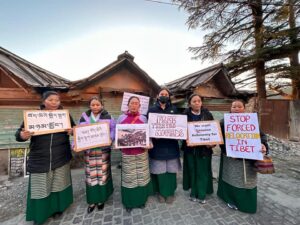Evicted, attacked & abused: new findings expose danger vulnerable women face under China’s rule
 London, March 20: A new report has revealed that even today, women in disadvantaged groups in China remain the most vulnerable to violence and face the threat of it every day. These findings are in stark contrast to the stance of the Chinese government, who have been quick to boast of the progress made for women for International Women’s day earlier this month.
London, March 20: A new report has revealed that even today, women in disadvantaged groups in China remain the most vulnerable to violence and face the threat of it every day. These findings are in stark contrast to the stance of the Chinese government, who have been quick to boast of the progress made for women for International Women’s day earlier this month.
The report from the China Human Right Defenders group finds that those women who find themselves on the fringes of society such as petitioners and trafficked sex workers remain at the greatest risk, with almost one-third of them reporting of being first attacked as teenagers and children. In addition, 42% of women said they had experienced being in “violent surroundings”, with the length ranging from days to years.
The sex trade in China has strongly risen following the beginning of government economic reforms that first began in 1979, however it is still not legalized or regulated. This has led to female sex workers becoming increasingly exposed to attacks. The report cited frequent cases of these attacks being committed by police officers and other law-enforcement officials with women admitting such attacks involved being “beaten and kicked” and forced to “strip-dance”
Interviews conducted with these “marginalized women” further painted a frightening picture. 75% revealed they have been victims of violent attack and more than one in five reported of being sexually violated. Seven percent reported they have been victims of “other” forms of violence which includes medicalized violence such as forced abortion and sterilization – such reproduction policies have continued to be brutally enforced in Tibet, with many eyewitness accounts from Tibetan women who have escaped to exile.
Many of these female sex workers are those from rural backgrounds looking to make a living in a growing cash economy, such as women nomads (drogmo), who have traditionally lived a laborious life compared to their male counter-parts. The forced resettling of the nomads – which has occurred primarily in Tibetan regions – has forced these people to adapt to an environment alien to them; women especially are at a disadvantage, as traditionally they are given less access to education. Official illiteracy rates for rural females across China were almost three times higher for women at 16% compared to 6% of rural males; however the problem is even more severe in Tibet where more than half of all women (nomadic and non-nomadic) are illiterate with official figures at 60% (see Purging the Treasure House, TWA, 2011).
The lack of education, educational facilities and job opportunities, coupled with the forced resettlements has resulted in growing evidence of a number of women turning to the sex trade to support themselves and their families. Tibetan nomad men have in turn too suffered from these conditions, jobless and forced in cramped living conditions, many have turned to alcoholism which in turn is a common cause to the beginning of violence towards women.
Alongside other countries, China is compelled to protect women against violence as stipulated under the Convention for the Elimination of All Forms of Violence Against Women (CEDAW), to which Beijing is a signatory.
The suffering of not only these women, but also all Tibet nomads is unacceptable and the Chinese government must address the issue promptly and openly. This report from the China Human Rights Defenders group eliminates the shroud of lies from the government. They must allow greater transparency about these true effects of their social and economic policies upon those vulnerable in society – particularly women from marginalised ethnic minorities such as Tibetans and Uyghurs, and end the detrimental policy of forced resettlement of nomads.



